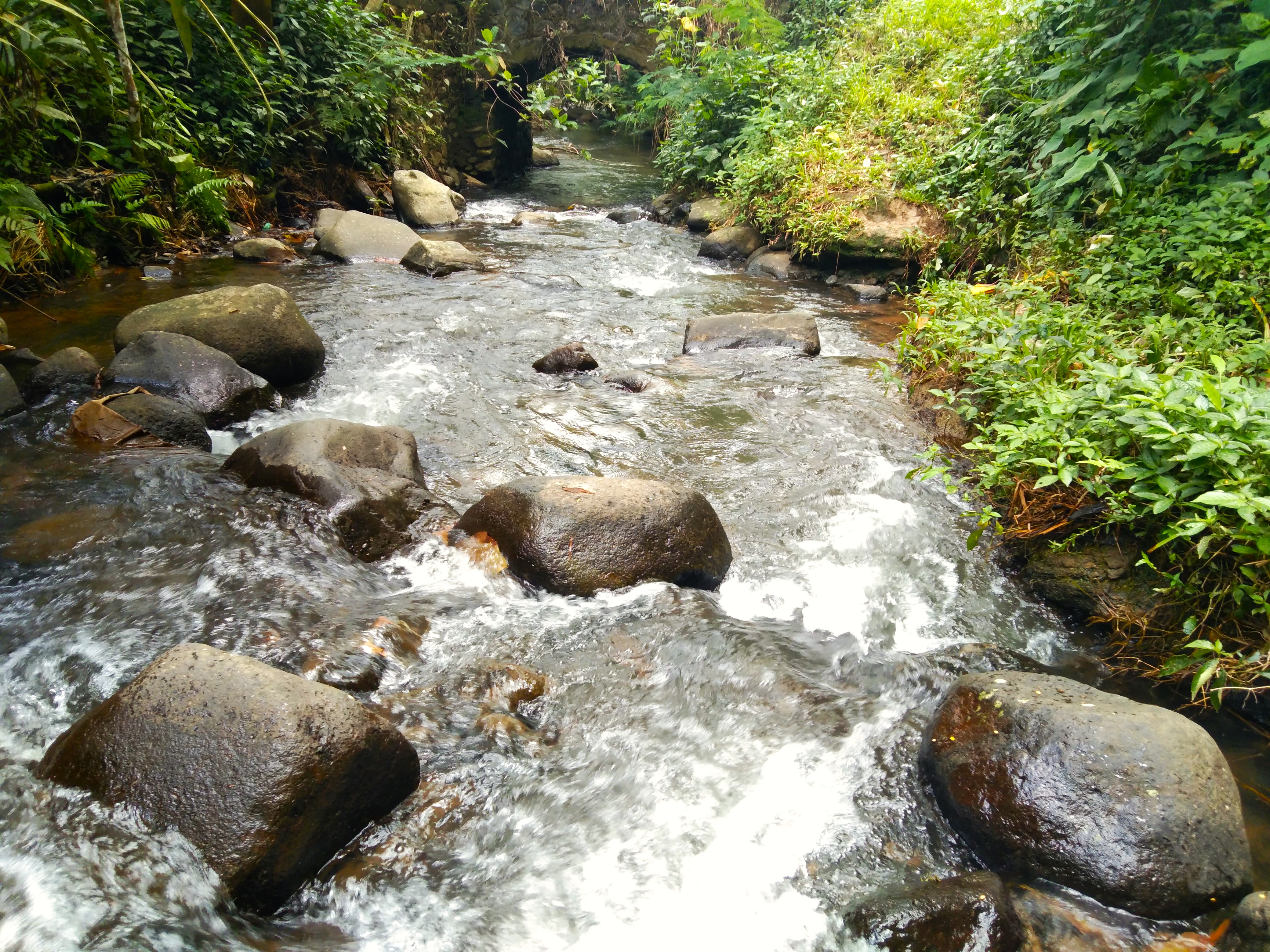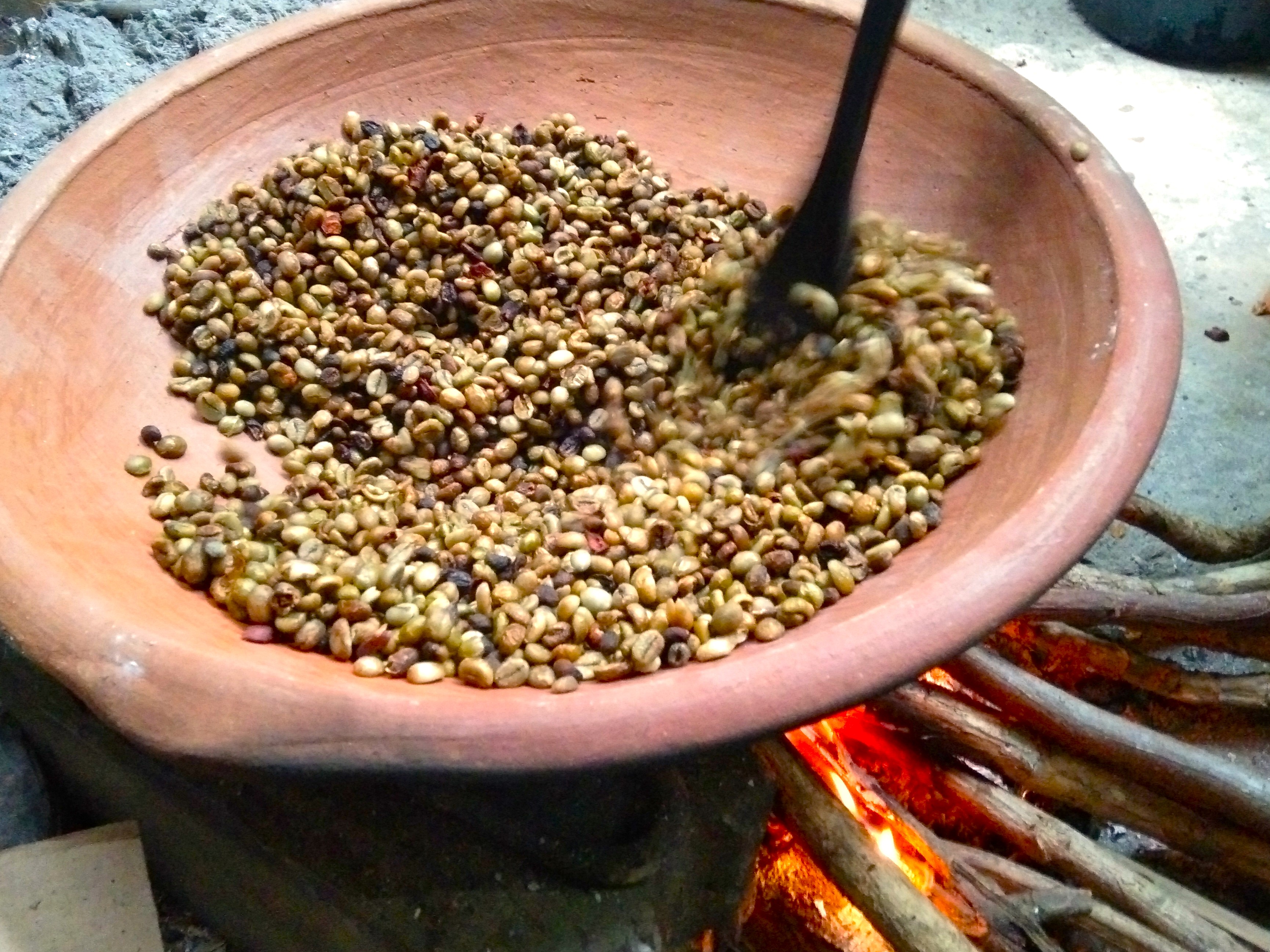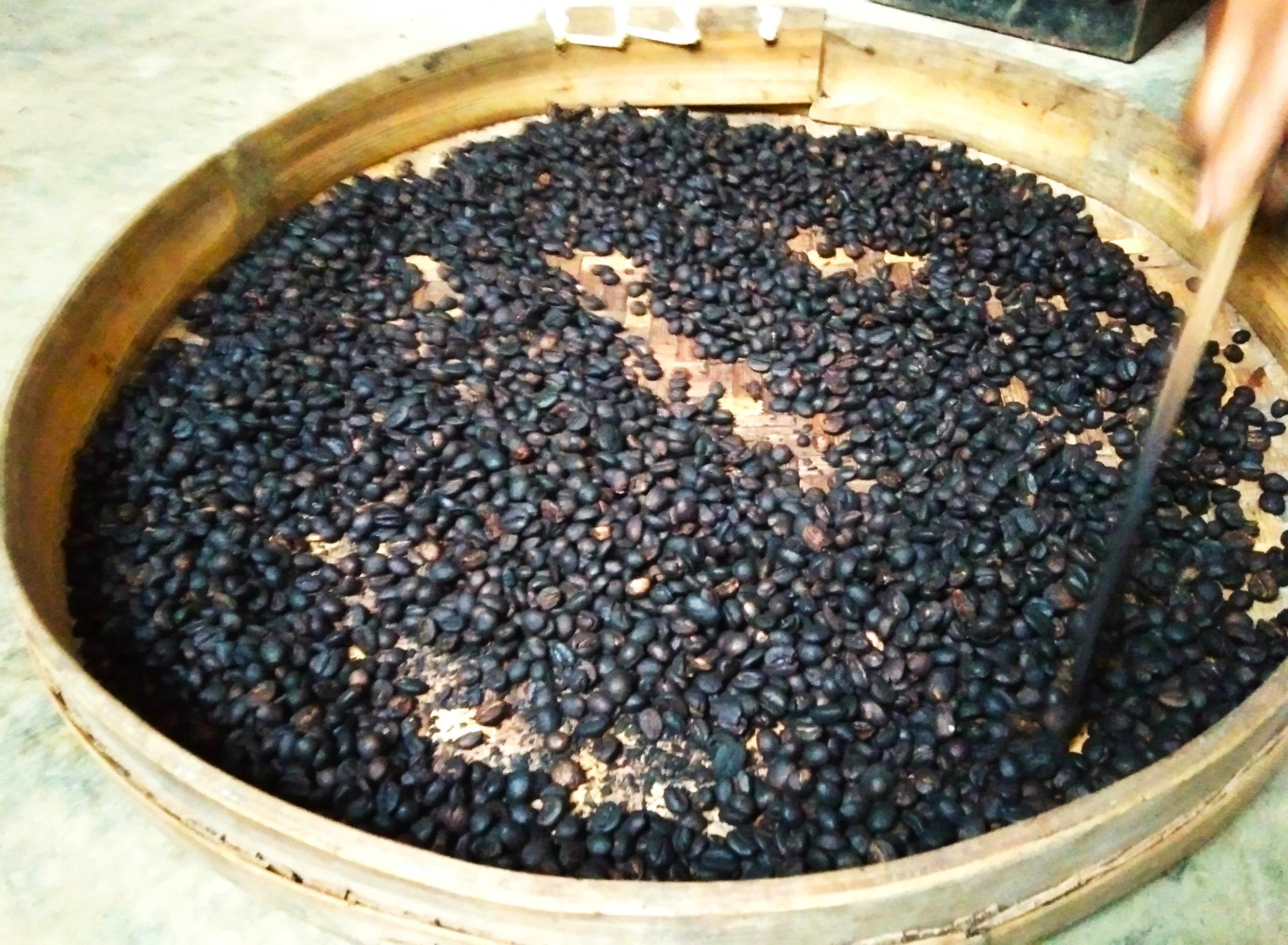
THE PULSE OF JAVA: THE HARMONY OF COFFEE AND RIVERS
Along the banks of a river that flows slowly but shimmers with crystal clear water, a captivating sight unfolds. The river is not wide, dotted with large and small rocks half-buried, as if holding the secrets of the ages. These rocks are likely remnants of a volcanic eruption to the west of the village, which occurred decades, perhaps even hundreds of years ago. The gentle flow of water crashes against the rocks, creating a constant, peaceful gurgling sound, as if nature were whispering, inviting tranquility.
Not far from the river, just a stone's throw away, groves of bamboo grow luxuriantly, standing proudly at regular intervals. These bamboo groves shade a small, winding path, connecting the river to a village located on higher ground. Alongside the bamboo groves, coffee plantations stretch, though not particularly extensive, directly bordering the riverbank. The bamboos are not merely shade-providing but also ecosystem-building. Their fibrous roots absorb water and distribute it directly to the surrounding plants, creating a perfect natural harmony. Often, springs are found beneath the shade of these bamboo groves, as if a gift from the earth to the surrounding life. This scene, with its clear river, ancient rocks, bamboo groves, and coffee plantations, is like a living natural painting, inviting anyone to pause and soak in the peace it offers.

On the right side of the winding road that leads up to the village above, another, larger coffee plantation stretches. Both coffee plantations are owned by one of the villagers, a farmer who cares for his land with dedication. Robusta coffee trees grow luxuriantly, neatly lined up under the shade of towering trees, creating a cool and shady atmosphere. Among them, towering coconut trees, some 10 to 12 meters tall, stand proudly, providing not only shade but also supporting the plantation owner's economy. While waiting for the coffee harvest, the ripe coconuts offer a steady source of income.
Every two to three weeks, a coconut buyer visits the farm. He nimbly climbs the coconut trees, carefully selecting only the truly ripe coconuts, leaving the young and even the unripe ones for a later harvest. This practice is not just a tradition, but also a tangible manifestation of the village's local wisdom. Both residents and buyers carefully maintain a harvesting rotation, ensuring the coconut trees remain healthy and productive. Beneath this simplicity lies a deep trust in nature—a harmony that maintains ecological balance and economic stability between farmers and buyers.

As you step into the shady coffee plantation, a gentle breeze touches your skin, bringing with it a coolness that immediately seeps into your soul. The leaves rustle gently in the breeze, creating a natural symphony that blends with the gurgling of the river across the street, creating a soothing melody. The village atmosphere, far from the hustle and bustle of the city, feels so real, like a warm embrace from nature, inviting you to unwind. Under the shade of coconut trees and other tall trees, the aroma of wet soil and robusta coffee fills the air, transporting visitors as if they were drawn into a world where time passes more slowly.
The leaves softly cry out, gently touched by the clear light, and the wind dances shamelessly to greet the day that has not yet begun. Together with the friendly owner of the coffee plantation, the daily activities in the plantation begin. With great care, the owner of the plantation explains how to care for the coffee trees so that they continue to grow well and be productive. He begins by cutting off branches and twigs that are no longer productive, ensuring only the shoots that will later flower and produce ripe red coffee cherries. Meanwhile, the weeds growing around the tree are cut and then piled at the base of the tree. This pile of grass not only serves to protect the roots from the sun's heat, but it will also slowly decompose into natural fertilizer, enriching the soil for the next planting season.
Every farmer's movement is carried out with full awareness, as if he were dancing to the rhythm of nature. Anyone who witnesses this cannot help but be amazed. In this coffee plantation, every leaf, every drop of river water, and every tuft of weed plays a role in sustaining life. The peaceful atmosphere of the village, filled with the aroma of coffee and the sounds of nature, invites anyone to directly experience this simple miracle. As the sun begins to rise higher, filtering through the leaves, anyone who visits this place will find that the memories of this coffee plantation, with its coolness, the warmth of the villagers, and the harmony of nature, will live on in their minds, like a never-ending story.
As midday approaches, around 11:00 a.m., activity on the coffee plantation pauses. The owner lays out simple mats under the shade of tall trees, inviting guests to join in a warm moment of togetherness. Sitting together on the mats, they share news and laugh while sipping on the fresh mineral water that has been served. The freshness of the water seems to wash away the fatigue and thirst after working in the plantation, leaving a feeling of comfort that is difficult to describe. While waiting for lunch, the owner offers local snacks – simple, flavourful treats that instantly bring the atmosphere closer to village life.

Soon, lunch arrived, bringing with it the enticing aroma of local cuisine prepared using fresh spices picked from plants growing not far from the coffee plantation. Lunch was served on mats, amidst the shady garden, accompanied by a gentle breeze that caressed the face and wiped away fatigue. Finally, a cup of freshly brewed robusta coffee was served, its aroma filling the air, enhancing the intimate atmosphere with the owner of the plantation. Laughter, stories, and jokes flowed like the refreshing river water, making anyone who visited no longer feel like a guest, but part of the extended family of the plantation owner and the villagers.
This moment is simple yet profound, an experience not easily found elsewhere. Beneath the shade of coconut trees, accompanied by the babbling of the river, the sound of bamboo trees rustling in the breeze, and the aroma of coffee. Anyone who visits will feel an authentic warmth, a bond forged with the plantation owners and residents through laughter and shared meals. This experience becomes a priceless memory, a life story to take home to share with friends, colleagues, and even family. The story of a friendly village, a captivating coffee plantation, and the intimacy created under the open sky will continue to entice anyone to come to experience the village's unforgettable charm for themselves. Come to experience this wonder, for new stories await on this coffee plantation.
After enjoying a warm lunch amidst the coffee plantation, the sense of togetherness lingers. The mats are rolled up, the cutlery packed, and the spirit is renewed for the next, equally captivating adventure. The plantation owner, with infectious enthusiasm, invites you to participate in a truly down-to-earth activity: "Ngreweng," the term used by villagers for roasting coffee beans using traditional methods and traditional equipment. This is more than just an activity; it will add an empirical experience that engages all the senses, challenges your dexterity and speed, and brings you closer to the soul of this village's robusta coffee.

Under the shade of a coconut tree, a medium-sized earthenware vessel is heated over a small fireplace, as the wind carries the aroma of firewood. The owner of the plantation hands over simple wooden tools and teaches you how to move the coffee beans relentlessly within the heating vessel. Hand movements must be agile yet controlled, as if dancing to the rhythm of the crackling fire. Eyes must remain sharp, observing every change in the colour of the coffee beans, from pale green to a perfect golden brown. Instincts are honed, as the level of ripeness of the beans will determine the flavour of the coffee when brewed. Every second is a personal, exciting, and concentrated challenge, as if part of the magical process that brings a cup of coffee to life.
Laughter and cheers of admiration erupted as the beans were perfectly roasted, accompanied by praise and appreciation from the farm owner. The sweet aroma of freshly roasted coffee was a sweet whisper that touched the nose, filling the air, mingling with the gentle breeze and the babbling of the river a stone's throw away. Creating an unforgettable moment. This activity is not just about coffee, but also about connecting with the traditions, skills, and passion of the farm owners and villagers who preserve their ancestral heritage. This experience is an open invitation for anyone to visit, get involved, and experience for themselves the joy of "Ngreweng" coffee amidst a vibrant farm, accompanied by the laughter and stories of residents. Join this adventure, feel the sensation of being part of the village's enthusiastic coffee story, and bring home memories that will continue to inspire!

An adventure in a coffee plantation that ends with the enticing aroma of "Ngreweng." Under the soft twilight, the owner invites you to step into a meaningful closing rhythm: pounding coffee beans with a wooden "lumpang" and "alu," a tradition that seems to dance with time. Freshly roasted coffee beans, still warm and fragrant, are placed into a "lumpang" that looks worn but remains sturdy, holding decades of stories. With rhythmic movements, loving hands pound the beans into a fine powder, each beat as if reciting a prayer of gratitude to the Creator. The coffee grounds are scooped out with a wooden spoon, placed in a simple container, and ready to be brewed according to taste.
In a corner of the garden, beneath the loyal shade of the trees, a cup of kopi tubruk is born. Hot water touches the coffee grounds, releasing a soul-stirring aroma, filling the cup with a warmth that is so Javanese. This is what is called kopi tubruk, a loyal friend of the garden owner and the villagers, accompanying them in the morning before they set out to navigate the day and in the evening when fatigue melts into the twilight. With fried banana or sweet potato, or fried cassava, they sit sharing laughter and simple stories about the garden, plants, and activities. In every sip of kopi tubruk, there is a feeling of gratitude for the gift of fertile soil, for the hands that work, and for the togetherness that never fades. This moment is so poetic and touching. This is a portrait of the village community's life: humble, simple, full of sincerity, and filled with love for nature and living things. Come, feel this warmth, and let your heart be drawn to the village that weaves love in every cup of kopi tubruk.
